| Founder | Lillian Dickson |
|---|---|
| Founded at | Formosa |
| Website | mustardseed |
Mustard Seed International (MSI) is an interdenominational Christian organization. It was established in Formosa (now Taiwan) by Lillian Dickson after World War II. [1]
| Founder | Lillian Dickson |
|---|---|
| Founded at | Formosa |
| Website | mustardseed |
Mustard Seed International (MSI) is an interdenominational Christian organization. It was established in Formosa (now Taiwan) by Lillian Dickson after World War II. [1]
After the war, Dickson and her husband returned to Formosa to continue their ministry work. The work eventually evolved into what is now known as Mustard Seed International. [2]
During the 1960s, MSI supported clinics worldwide and was involved in the establishment of various public health interventions. [3]
Today, MSI primarily operates in Indonesia. Over its six-decade history, it has interacted with tens of thousands of people. [3]
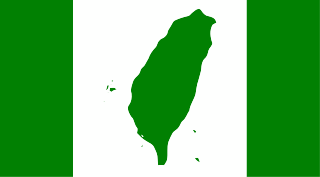
The Taiwan independence movement is a political movement which advocates the formal declaration of a sovereign country for Taiwan, as opposed to Chinese unification or the status quo in Cross-Strait relations. In some cases, especially with the People's Republic of China, the term also refers to those supporting the independence of the Republic of China.
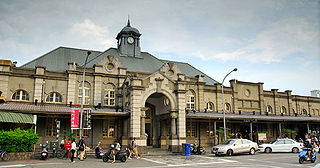
Taiwan Province is a de jure administrative division of the Republic of China (ROC). Provinces remain a titular division as a part of the Constitution of the Republic of China, but are no longer considered to have any administrative function practically.

The Kaohsiung Incident, also known as the Formosa Incident, the Meilidao Incident, or the Formosa Magazine incident, was a crackdown on pro-democracy demonstrations that occurred in Kaohsiung, Taiwan, on 10 December 1979 during Taiwan's martial law period.

The Tangwai movement, or simply Tangwai, was a democratic political movement outside the ruling Kuomintang (KMT) in Taiwan before their Democratic Progressive Party (DPP) was formed. Although the KMT had allowed contested elections for a small number of seats in the Legislative Yuan, opposition parties were still forbidden. As a result, many opponents of the KMT, officially classified as independents, ran and were elected as members "outside the party." The movement was at times tolerated and other times suppressed, the latter being the case particularly after the Kaohsiung Incident of 1979. Members of the movement eventually formed the Democratic Progressive Party, which after opposition political parties were legalized, contested elections and won the Presidency with candidate Chen Shui-bian, ending decades of single party rule in Taiwan.

The Republic of Formosa was a short-lived republic that existed on the island of Taiwan in 1895 between the formal cession of Taiwan by the Qing dynasty of China to the Empire of Japan in the Treaty of Shimonoseki and its being taken over by Japanese troops. The Republic lasted 151 days; it was proclaimed on 23 May 1895 and extinguished on 21 October, when the Republican capital Tainan was taken over by the Japanese. Though sometimes claimed as the first East Asian republic to have been proclaimed, it was predated by the Lanfang Republic in Borneo, established in 1777, as well as by the Republic of Ezo in Japan, established in 1869.

George Leslie Mackay was a Canadian Presbyterian missionary. He was the first Presbyterian missionary to northern Taiwan, serving with the Canadian Presbyterian Mission. Mackay is among the best known and most influential Westerners to have lived in Taiwan.

James Laidlaw Maxwell Senior was the first Presbyterian missionary to Formosa. He served with the English Presbyterian Mission.

Taiwan Railways Administration (TRA) was a governmental agency in Taiwan which operated Taiwan Railway from 1948 to 2023. It managed, maintained, and operated conventional passenger and freight railway services on 1,097 km (682 mi) of track. Passenger traffic in 2018 was 231,267,955.

Micro-Star International Co., Ltd. is a Taiwanese multinational information technology corporation headquartered in New Taipei City, Taiwan. It designs, develops and provides computer hardware as well as related products and services, including laptops, desktops, motherboards, graphics cards, all-in-one PCs, servers, industrial computers, PC peripherals, and car infotainment products, among other products.
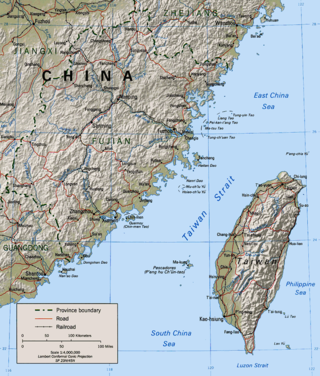
The First Taiwan Strait Crisis was a brief armed conflict between the People's Republic of China (PRC) and the Republic of China (ROC) in Taiwan. The conflict focused on several groups of islands in the Taiwan Strait that were held by the ROC but were located only a few miles from mainland China.
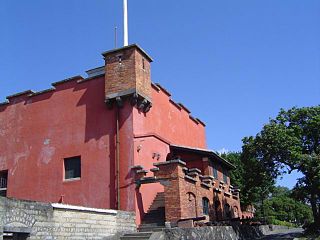
Fort Santo Domingo is a historical fortress in Tamsui District, New Taipei City, Taiwan. It was originally a wooden fort built in 1628 by the Manila-based Spanish East Indies of the Spanish Empire, who named it in Spanish: el Fuerte de Santo Domingo, lit. 'the Fort of Saint Dominic'. However, after refurbishing it in stone, the initial fort was repeatedly ordered to be dismantled and withdrawn from around 1637 by Spanish Governor-General Sebastián Hurtado de Corcuera for economic downsizing and retrenchment, which their rival Dutch East India Company (VOC) of the Dutch Empire soon found out and later invaded in 1641 and won by the Second Battle of San Salvador in 1642. After the battle, the Dutch rebuilt a fort in the original site in 1644 and renamed it in Dutch: Fort Antonio, after Antonio van Diemen, the then Governor-General of the Dutch East India Company (VOC). Since the Dutch were called in Taiwanese Hokkien Chinese: 紅毛; Pe̍h-ōe-jī: Âng-mn̂g; lit. 'Red-haired (people)') by the Han Chinese immigrants during the time, the fort was then nicknamed in Taiwanese Hokkien Chinese: 紅毛城; Pe̍h-ōe-jī: Âng-mn̂g-siâⁿ; lit. 'Red-hair fort'.
James Laidlaw Maxwell Jr. was a pioneering modern English Presbyterian medical missionary to Formosa (Taiwan) and China. He was the son of James Laidlaw Maxwell Sr.
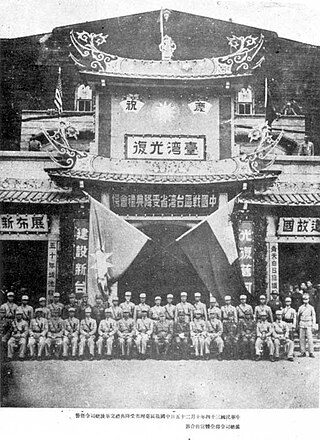
Retrocession Day is the annual observance and former public holiday in Taiwan commemorating the end of Japanese rule of Taiwan and Penghu and the claimed retrocession ("return") of Taiwan to the Republic of China on 25 October 1945. However, the idea of "Taiwan retrocession" remains in dispute.

Thomas Barclay was a missionary of the Presbyterian Church of England to Formosa from 1875 until his death. His ministry in southern Taiwan has been compared to the work done in northern Taiwan by George Leslie Mackay. He founded Tainan Theological College and Seminary in 1876.
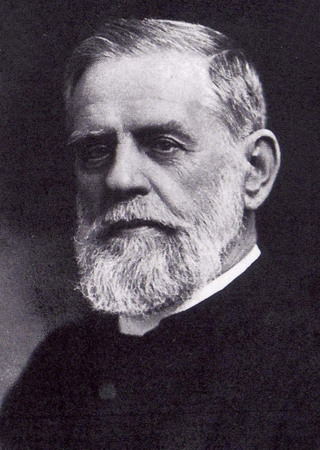
William Campbell (1841–1921) was a Scottish Presbyterian missionary to Formosa. He wrote extensively on topics related to Taiwan and was also responsible for founding the island's first school for the blind. Interested in the early history of the island, his knowledge of the time was such that he was called "without doubt the greatest authority on this subject living". He was probably the first European to see Sun-Moon Lake, which he named Lake Candidius in honour of the seventeenth century Dutch missionary George Candidius.

The Taiwan Church News is a publication of the Presbyterian Church in Taiwan. It was first published in 1885 as the Tâi-oân-hú-siâⁿ Kàu-hōe-pò under the direction of missionary Thomas Barclay, a British pastor of the Presbyterian Church, and was Taiwan's first printed newspaper, making it the longest-running newspaper in Taiwanese history. This early edition was also notable for being printed in romanised Taiwanese using the Pe̍h-ōe-jī orthography. The publication was banned during the latter stages of Japanese rule and editions were also impounded on several occasions during the martial law era in post-war Taiwan for discussing forbidden subjects. The newspaper is renowned for its use of Pe̍h-ōe-jī.
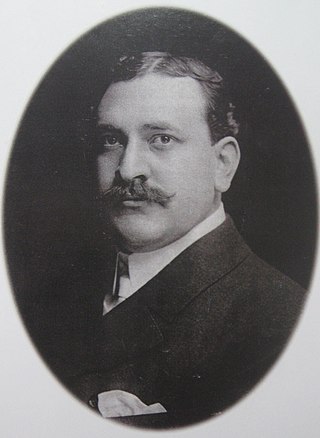
James Wheeler Davidson was an American-born Canadian businessman, diplomat, explorer, journalist, and philanthropist. He is remembered for writing The Island of Formosa, Past and Present (1903), a book on the history of Taiwan. He is also noted for greatly aiding the internationalisation of Rotary International.
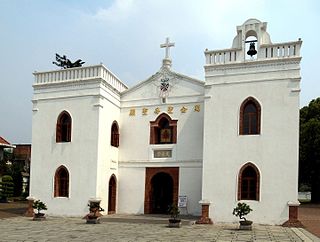
Christianity in Taiwan constituted 3.9% of the population, according to the census of 2005; Christians on the island included approximately 600,000 Protestants, 300,000 Catholics and a small number of members of the Church of Jesus Christ of Latter-day Saints.

Lillian Dickson was an independent missionary, author, and public speaker. She used her maternal identity to develop her vocation in the middle of the twentieth century. Originally, she and her husband, James Dickson (1900-1967), were sent by the Presbyterian Church of Canada, to Taiwan in 1927. Lillian lived and worked in Taiwan until she died, except for the period between 1940 and 1947 when she and her husband were transferred to British Guiana because of growing tensions and war between Japan and the United States. After her return to Taiwan, Lillian eventually developed a long lasting career as an independent missionary. In particular, she founded Mustard Seed International. and The Mustard Seed Mission.

Wang King-ho was a Taiwanese physician. He held local political office from 1945 to 1955, and treated residents of Beimen District and surrounding areas after an outbreak of blackfoot disease in the 1950s.
{{cite web}}: CS1 maint: unfit URL (link)